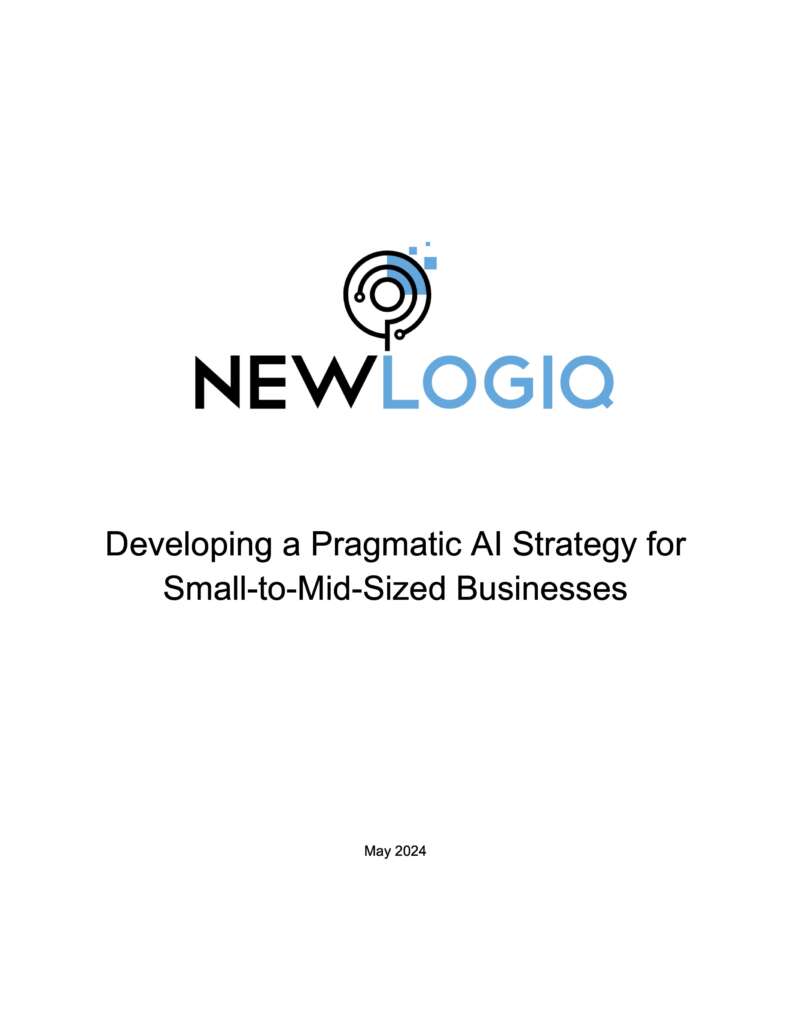The Value of an AI Assessment for SMBs
In today’s rapidly evolving business landscape, small and medium-sized businesses (SMBs) are increasingly turning to artificial intelligence (AI) technology to gain a competitive edge.
design-sprints-about
In today’s rapidly evolving business landscape, small and medium-sized businesses (SMBs) are increasingly turning to artificial intelligence (AI) technology to gain a competitive edge. An AI assessment refers to the process of evaluating a company’s current capabilities, determining how AI can be leveraged to drive growth and innovation and developing an AI roadmap with associated ROI. For SMBs, investing in AI technology is crucial for staying ahead of the curve and meeting the demands of an increasingly digital marketplace. An AI assessment is the pragmatic first step in navigating the complex and rapidly changing field of artificial intelligence.
Benefits of AI Assessment for SMBs
One of the key benefits of conducting an AI assessment for SMBs is the potential to identify areas where AI can drive increased efficiency and productivity. By automating repetitive tasks and streamlining processes, AI technology can help SMBs operate more effectively and focus on strategic initiatives. Additionally, AI can lead to significant cost savings by reducing manual labor and optimizing resource allocation.
Moreover, an AI assessment can identify ways to improve decision-making for SMBs. By leveraging AI-powered analytics and insights, businesses can make data-driven decisions that drive growth and profitability. This can also lead to enhanced customer experiences, as AI technology can personalize interactions and anticipate customer needs.
Next, AI assessments, when properly done, can provide SMBs with insights into new market opportunities and trends that may provide a competitive advantage. By leveraging AI to analyze market data and consumer behavior, businesses can stay ahead of competitors and adapt quickly to changing market conditions.
Finally, AI assessments can help SMBs improve their internal processes and workflows by identifying bottlenecks and inefficiencies that may be hindering growth. By implementing AI solutions to optimize operations, businesses can streamline their processes, reduce costs, and enhance overall productivity.
How to Conduct an AI Assessment
To conduct an AI assessment for SMBs, it is essential to first understand the company’s business goals and objectives. By aligning AI initiatives with strategic priorities, SMBs can ensure that technology investments deliver tangible results. Next, businesses should identify key areas for AI implementation, such as customer service, marketing, or operations. Finally, selecting the right AI tools and technologies is crucial for successful implementation and maximizing ROI.
When conducting an AI assessment, SMBs should also consider the scalability and flexibility of targeted AI solutions to ensure that they can adapt to changing business needs and technological advancements. By choosing AI technologies that can grow and evolve with the business, SMBs can future-proof their investments and stay competitive in the long run.
Finally, collaboration and communication are key components of a successful AI assessment. A well run AI assessment involves key stakeholders from different departments in the assessment process to ensure that all perspectives and requirements are taken into account. By fostering a culture of collaboration and innovation, businesses can quickly identify ways to maximize the benefits of AI technology and drive sustainable growth.
Case Studies
Several SMBs have already experienced success with AI assessments. For example, a retail startup implemented AI-powered inventory management systems, resulting in a 20% increase in sales and a 30% reduction in overhead costs.
In another case study, a manufacturing company utilized AI technology to optimize their supply chain management processes, resulting in a 25% reduction in lead times and a 15% increase in production efficiency. By leveraging AI to forecast demand, manage inventory levels, and streamline logistics, the company was able to improve operational efficiency and meet customer demands more effectively.
Finally, a financial services firm implemented AI-powered chatbots to enhance the customer experience, resulting in a 40% reduction in customer query response times and a 25% increase in customer satisfaction ratings. By leveraging AI to provide personalized and timely support to customers, the firm was able to improve customer loyalty and retention rates.
Conclusion
In conclusion, the value of an AI assessment for SMBs cannot be overstated. By developing a clear roadmap to leverage AI technology, businesses can drive efficiency, cost savings, improved decision-making, and enhanced customer experiences. As AI continues to evolve, SMBs that begin their journey with an AI assessment are well-positioned to thrive in the digital economy. Looking ahead, the future outlook for AI technology in SMBs is promising, with continued advancements and opportunities for growth and innovation. To learn more about how Newlogiq can provide you a personalized AI assessment, setup a free introductory appointment today.




